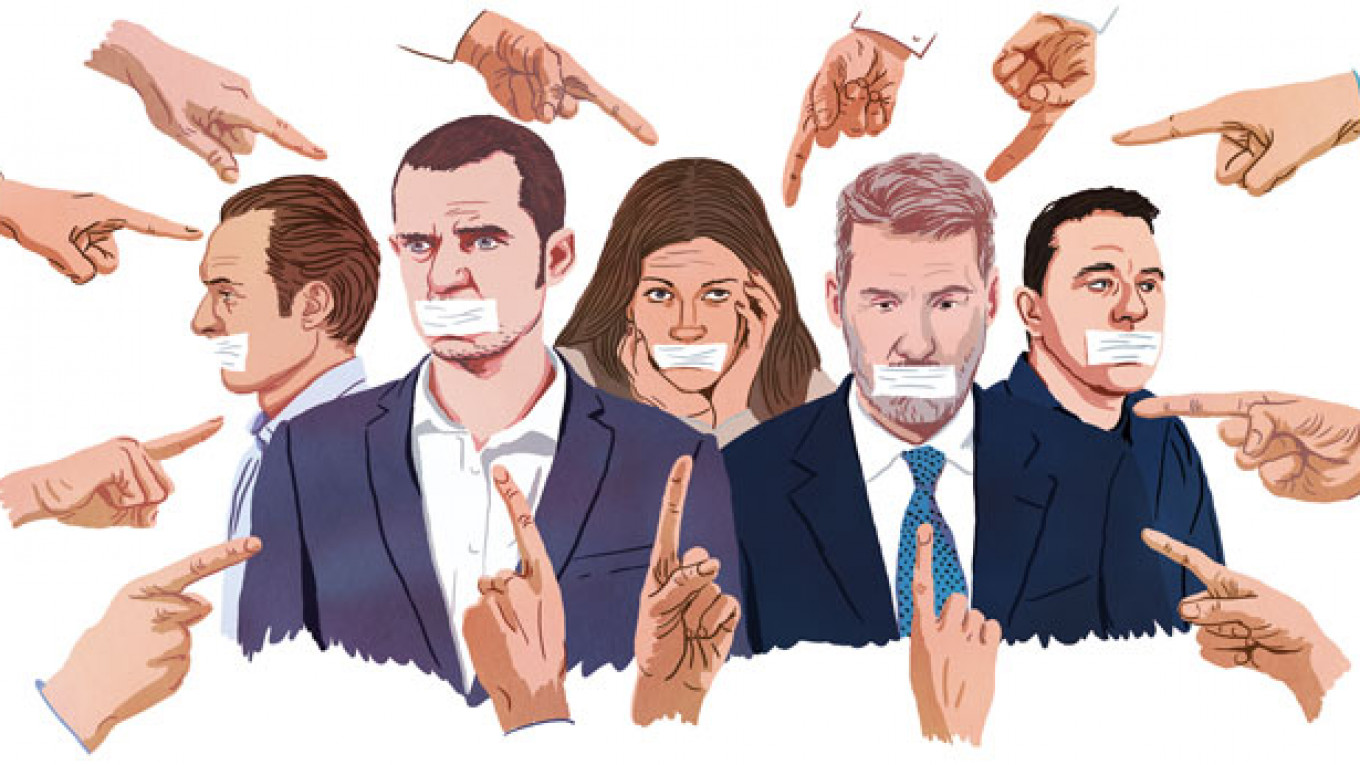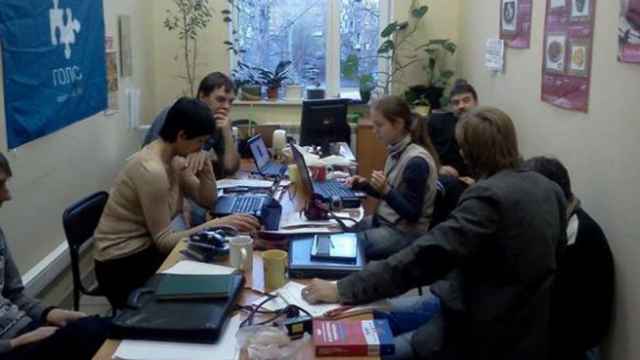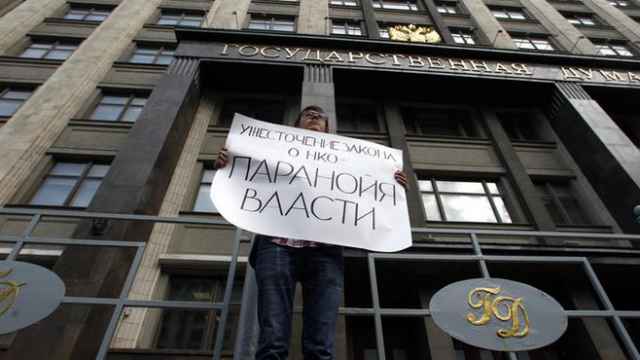Activist Pavel Chikov could react only with sarcasm when a court handed down a winding up order against his Agora legal advocacy association. "As the first NGO ever to have been liquidated in a Russian court, we are so proud," he wrote on Twitter.
The next day, another organization, the Golos Democracy Foundation, fell under the same spotlight when the Justice Ministry issued almost identical proceedings. Like Agora, Golos is a prominent and influential NGO, a thorn in the Kremlin's side. And like Agora, it has also been labeled a "foreign agent."
Co-chair of Golos Grigory Melkonyants, responded to the proceedings in a completely serious way. "It seems a new campaign has begun to shut down NGOs on the "foreign agents" list," he wrote on Facebook. "Out of sight — out of mind."
In 2012, Vladimir Putin signed a law requiring NGOs to label themselves "foreign agents" if they receive foreign funding and are engaged in vaguely defined "political activity." Since then, hundreds of Russian NGOs have been locked in a battle with the Justice Ministry, unwilling to accept such a negatively-charged label. In the past four years, NGOs on the "foreign agents" list were subject to time-consuming prosecutorial inspections and six-figure fines. Some were unwilling to function under the label and deal with the scrutiny, and shut down.
At the time of signing the new law, Kremlin officials insisted the "foreign agent" label did not mean an organization should automatically close its doors. But the moves this month would seem to suggest that position is changing, and that more is to come. It is election year, and Russian authorities are looking to clear the road ahead: to ensure independent activists do not get in the way of important State Duma and gubernatorial votes.
Largest Ones Go First
Agora and Golos have been a nuisance for the Kremlin for many years.
Agora's sharp legal minds engaged in legal advocacy for the most high-profile, politically motivated cases. They defended those who participated in mass opposition rallies over 2011-2012, including, in particular, those arrested during the May 2012 rally on Bolotnaya Square. They were instrumental in pushing for an investigation into the attack on journalist Oleg Kashin. They defended many other prominent figures sued by government officials.
Golos, meanwhile, acted as a hugely influential election monitor that exposed mass rigging during the 2011 State Duma elections. Its activists created a live map of voting violations. The resource was quickly shut down and it became clear that those in power don't welcome the NGO's efforts.
In a 2013 report to Putin, Prosecutor General Yury Chaika singled out Golos and Agora, accusing them of using legal loopholes to avoid landing on the "foreign agents" list. Nevertheless, both NGOs wound up on the list in 2014.
Recent moves to wind up the legal entities of Agora and Golos were done on purely technocratic grounds. Agora was accused of "attempts to shape public opinion" by arguing its way off the "foreign agents" roster. A recent inspection into the Golos foundation meanwhile "revealed" it didn't have an office at the address listed.
Political analyst Gleb Pavlovsky told The Moscow Times that he was not surprised at the timing of the Kremlin crackdown. Agora and Golos are two of the country's largest NGOs, with infrastructure set up all over the country, he noted. During election year, this could easily turn into a broad network of civic involvement.
"Those in charge of domestic policy in the Kremlin consider them dangerous," said Pavlovsky, who himself used to work as an adviser in the presidential administration. "They are not confident at all the elections will run smoothly, which is why the mere existence of these organizations is an irritant."
Agora's Chikov agrees, adding that the new campaign looks like a last throw of the dice for the Kremlin. "Social activists are resourceful people, and they quickly learned to bypass certain restrictions," he said. "The only thing officials could do was push them out of the legal arena completely."
Both Chikov and Melkonyants say they formal liquidation of legal entities will not affect their organizations' work. "We plan on continuing our work no matter what," Melkonyants told The Moscow Times.
Tightening Grip
Political analyst Pavlovsky says he believes the recent crackdown is no coincidence, and that more is to come. As regional governors come up for re-election, they will most likely bring up the issue of "fifth column" NGOs getting in the way. "The presidential administration will have to react to complaints from top-ranking officials," Pavlovsky told The Moscow Times. "That's how the system works.
The Kremlin is expected to come down hard on those organizations that irritate it the most, says Chikov.
In addition to Agora and Golos, close scrutiny is likely to be extended to the Torture Prevention Committee and the Memorial human rights group. There have as yet been no formal attempts to liquidate these organizations. Indeed, some of their branch sub-units have even escaped the "foreign agents" roster. But their leaders believe it is only a matter of time before this changes.
"Two of our five branch organizations are currently on the list, and an hour ago I received a notification about another one," says Igor Kalyapin, founder of the Torture Prevention Committee. "Of course, we will take our chances in court — there's always hope that some judge would do the right thing."
Alexander Cherkasov, co-founder of Memorial, refused to talk about the NGO's future, but said that one thing was clear: The Kremlin will continue reinforcing its campaign against NGOs. "This the logic of this machine — that's how it works. It will keep running for as long as it has fuel," he said.
When contacted, the Justice Ministry said that they would continue to monitor NGO operations in Russia, and would take measures against all organizations found to violate legal regulations. The ministry did not specify whether other NGOs are in danger of court-mandated liquidation.
Contact the author at d.litvinova@imedia.ru. Follow the author on Twitter at @dashalitvinovv.
A Message from The Moscow Times:
Dear readers,
We are facing unprecedented challenges. Russia's Prosecutor General's Office has designated The Moscow Times as an "undesirable" organization, criminalizing our work and putting our staff at risk of prosecution. This follows our earlier unjust labeling as a "foreign agent."
These actions are direct attempts to silence independent journalism in Russia. The authorities claim our work "discredits the decisions of the Russian leadership." We see things differently: we strive to provide accurate, unbiased reporting on Russia.
We, the journalists of The Moscow Times, refuse to be silenced. But to continue our work, we need your help.
Your support, no matter how small, makes a world of difference. If you can, please support us monthly starting from just $2. It's quick to set up, and every contribution makes a significant impact.
By supporting The Moscow Times, you're defending open, independent journalism in the face of repression. Thank you for standing with us.
Remind me later.






